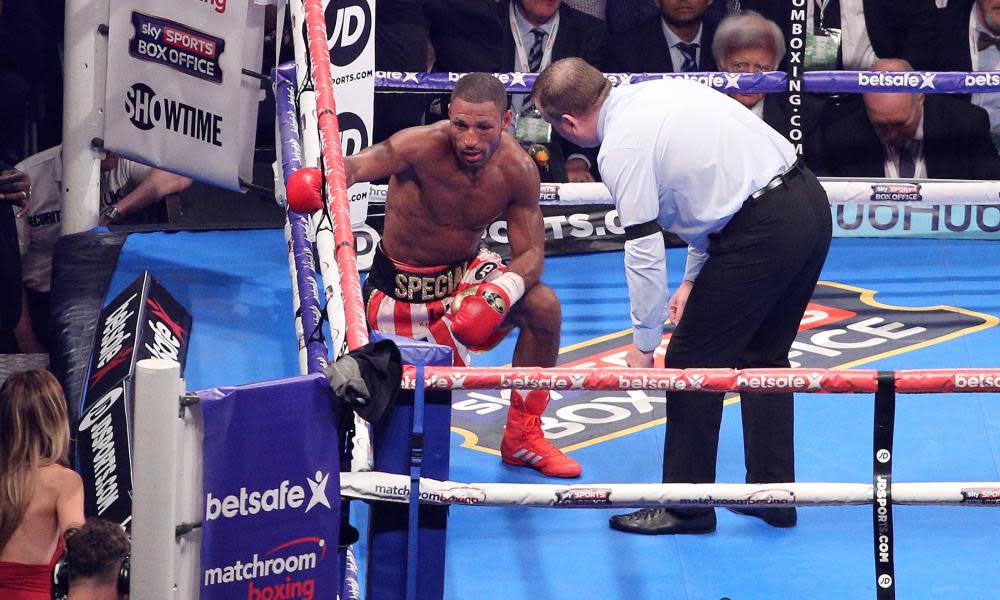Boxing: Kell Brook was brave, not a coward, for realising he was hurt

It took until Sunday morning for a CT scan to confirm that Kell Brook’s left eye socket was fractured and for him to explain what it was like trying to stand toe-to-toe with the world’s best welterweight while suffering double vision and a ring that appeared to be moving. But, really, we knew it was a bad one long before then.
It wasn’t just that the stabbing accuracy of Errol Spence Jr’s punches had blown Brook’s eye up like a marshmallow. It was also that, as the fight entered the championship rounds, he began rapidly blinking and pawing at his eye with his glove, as if trying to swat away a wasp from under his eyelid.
These were distress signals as loud as thunder. Yet barely had Brook left the ring having relinquished his IBF welterweight title than he was accused of committing boxing’s greatest sin: quitting. The charge came from the WBC cruiserweight world champion, Tony Bellew, who suggested that Brook could have carried on, and the US world champions Terence Crawford and Gervonta Davis.
True, Brook had taken a knee when he wasn’t under sustained attack in the 11th round, and rose slowly at the count of nine – as if making a silent pact with the referee to stop the fight. But boxing is a sport – albeit a brutal one – not a fight to the death. Which means that anyone who steps into a ring, risking their health for our pleasure, is brave by default – whatever happens when leather shatters skin or bludgeons bone.
All this should not need saying. Except that we now live in a world where those who shout the loudest are often listened to the most. And when even moments of immense courage, such as Brook somehow stumbling back on to the attack after being put on the floor in the 10th round, are forgotten. Sadly, just as in Brook’s previous fight with Gennady Golovkin – where his trainer Dominic Ingle threw in the towel after he fractured his other eye socket – there were scattered boos from the crowd and accusations of cowardice on social media.
But what made the reactions of Bellew particularly crass was that an hour or so earlier George Groves had spoken so movingly about how he had struggled to come to terms with putting the German Eduard Gutknecht into a coma last year. For all his understandable exuberance at winning the WBA super-middleweight title, that moment continues to haunt him. As Groves put it: “I pray for him with my family every day. I think about him all the time and this win is for him.”
Gutknecht has three young children and a wife, Julia, who is desperately struggling to make ends meet. In an interview last month she explained that her husband cannot walk or speak and is able to communicate only by nodding. For all that boxing fans tell themselves that the rate of death per 100,000 participants is higher in horse racing and American college football – and that basketball and rugby have a higher injury rate – Gutknecht exposes the stark reality of what can happen when a fighter takes too much punishment.
As she put it: “If the fight had been stopped early, Eddy might not be injured so badly now. Perhaps there would be a chance of living an independent life at least. With these kinds of injuries every minute counts. But I can’t keep asking that question as it destroys me. I can’t turn back the time.”
Then came some of the most heart-wrenching sentences a boxing fan will ever read. “We hope to hear his voice again, though. I also hope that one day he’ll put his arms around me again and tell me: ‘Darling, I love you. I know you are my wife and we have three wonderful children.’”
Of course, Gutknecht is not the only one who has suffered a brain injury in a British ring during the past year. The Scottish welterweight Mike Towell died last October, while Nick Blackwell underwent surgery after a British title contest against Chris Eubank Jr. And while the sport in this country is enjoying one of its periodic booms, with 90,000 packing Wembley to see Anthony Joshua beat Wladimir Klitschko and another 30,000 watching Brook, history tells us that the sport’s umami flavour can often turn sour. That means those who represent the sport should have a duty to engage their brains before their mouths.
When Bellew made his comments he was not to know that Brook had been told by his surgeon that he might have gone blind if he had fought one more round against Golovkin. Or that those thoughts were swimming around the Sheffield fighter’s mind when kneeling on the canvas. But all fighters know that it is often the punches you don’t see, the ones that your body and brain can’t brace themselves for, that do the most damage. And Brook clearly couldn’t see properly long before the end.
Incidentally, while Brook was blinking I briefly thought of Michael Watson, doing much the same on his stool after being knocked down in the 11th round of his rematch with Chris Eubank. And poor Gerald McClellan before he was pummelled to a brutal defeat by Nigel Benn. “I couldn’t see, I had to stop,” said Brook. “When you can’t see, there’s nothing you can do.” Of course, he is right. It is one thing to crave bloodlust – and quite another to wander blindly into a tragedy.

 Yahoo News
Yahoo News 
